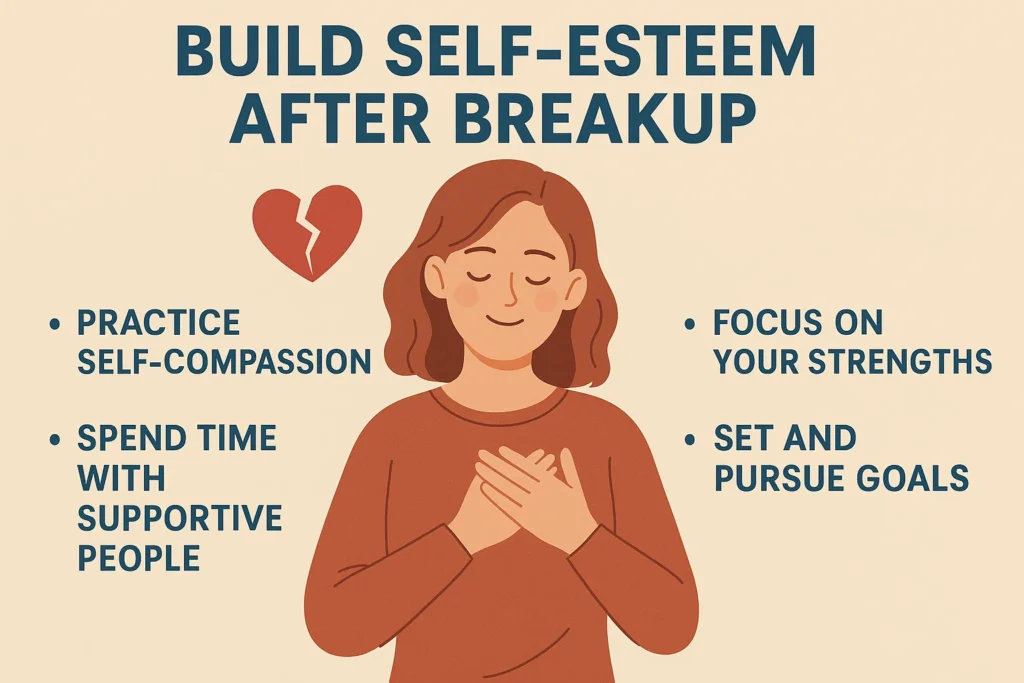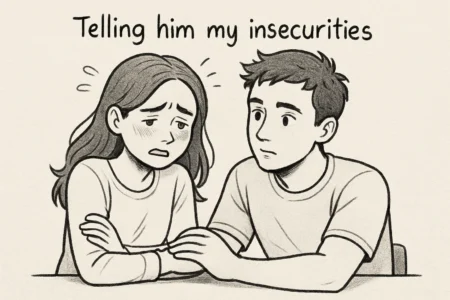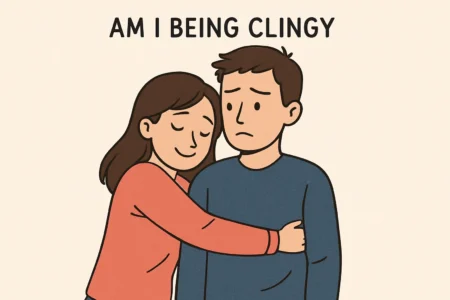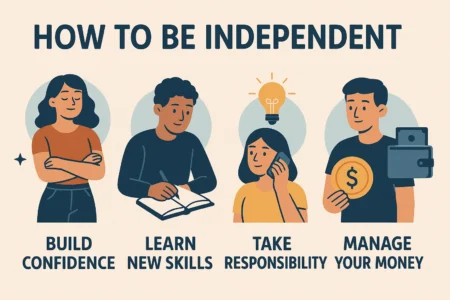The world just feels… off after a breakup, doesn’t it? Colors look a little duller. Your favorite songs are suddenly hollow. And that ache in your chest? The one that feels bizarrely physical and stubbornly permanent? It’s a profound dislocation. You feel like you’re floating, completely untethered.
But the scariest part, the one that keeps you up at 3 AM? It’s not just losing the person. It’s the terrifying feeling that you’ve lost yourself.
Your confidence, your sense of worth, even your understanding of who you are… it all seems to have packed a bag and walked right out the door with them. This isn’t some flimsy “get over it in 5 steps” list. This is about the real, messy, vital work you have to do to build self-esteem after breakup. The goal isn’t just getting back to who you were. It’s about building someone even stronger.
This is your guide to healing.
It’s not magic, and it’s not overnight. It’s work. But you are one hundred percent capable of doing it. Let’s start.
More in Self-Worth and Insecurities Category
Key Takeaways
- Your Worth is Non-Negotiable: A breakup is just an event. It is not a price tag on your worth as a human. The first, most critical job you have is to pry your identity away from their rejection.
- Grief Has No Timeline (and It’s Messy): You must give yourself permission to feel everything—the rage, the deep sadness, the confusion, the numbness—without judging yourself for it. Healing is not a straight line.
- Action Creates Confidence: You can’t just think your way into feeling better. Self-esteem is built. It’s the byproduct of small, consistent actions: basic self-care, proving your own competence, and rediscovering your values.
- Boundaries Are Your New Best Friend: Learning to set and actually enforce healthy boundaries is the ultimate act of self-respect. This is how you protect your healing and teach yourself how to trust you again.
- This Is an Opportunity (Even If It Sucks Right Now): As brutal as this moment feels, it’s a rare chance to hit reset. You get to redefine yourself, ditch what wasn’t working, and build a life that is authentically, entirely yours.
Why Does This Hurt So Much, Even If I Knew It Was Coming?
Here’s the thing: even when a relationship was a disaster, even when you knew it was the right call, the end can still feel like a freight train. Your brain and body are going through a legitimate withdrawal. This isn’t just in your head; it’s physiological. You spent months or years building neural pathways, habits, and a daily rhythm around another person. Their absence leaves a real, tangible void.
And it’s bigger than just the person. You’re also mourning the future you had planned. You’re grieving the identity you shared (“we”) and the comfortable, predictable vision you had for your life. You are not just grieving a person; you are grieving an entire timeline that just evaporated.
That is a massive loss. So, let’s get this out of the way first: Your pain is 100% valid. It is real. You are not crazy for feeling it this deeply.
Is It Normal to Feel This… Worthless?
Yes. It is devastatingly, horribly normal.
When we’re in a partnership for a long time, our identities can start to blur. Psychologists call it “identity fusion,” which is a fancy way of saying your “I” slowly melts into a “we.” We like that restaurant. We go hiking. We host great parties. When that “we” is suddenly fractured, you’re left staring at the “I” and wondering what, if anything, is even left.
I remember dating a guy who was an obsessive, high-altitude mountaineer. I am… not. I’m much more of a “walk in the park, maybe stop for a latte” kind of person. But I bought the boots. I learned to read topographical maps. I spent entire weekends cold, miserable, and pretending to love it. I became “the girl who hikes.”
When he left, I wasn’t just heartbroken about him. I was terrified because I had no idea who I was without him. My entire social media feed, my weekend plans, the very clothes in my closet—they were all tied to his hobby.
It took me months to realize I’d just… given my identity away. The breakup felt like a final judgment on my entire existence because I had made him my entire existence. This is why it feels so personal. Your brain is in a panic, scrambling and asking, “If I’m not ‘his partner,’ who am I?”
Did Their Actions Actually Define My Value?
This is the question, isn’t it? The one that echoes. And the answer is a clear, absolute, unmistakable no.
But it feels like they did. It feels like you were put on a scale, measured, and found lacking. This is the great, painful illusion of a breakup. Their decision to leave, or their behavior that forced you to go, is not a report card on your inherent worth.
It is a reflection of their needs. Their capacity. Their fears. Their path.
Read that again. Their choice was about them.
You could be the most perfect, beautiful, kind, and successful human on the planet, and someone could still leave you. They might want something different. They might not be ready. They might be emotionally crippled. They might simply not have the capacity to value what you offer.
Your value isn’t a stock that plummets because one “investor” pulled out. It is a constant. The only person who gets to set your worth is you. The work ahead isn’t about proving your worth to your ex, or the world, or some future partner. It’s just about remembering the worth that was there all along.
What Can I Do Today to Stop Feeling So Awful?
This is the triage phase. We are not rebuilding your life today. We are just stopping the bleeding. When you’re in that fresh, thick fog of heartbreak, your only job is to get through the next hour. Then the next one.
Focus on these first-aid steps. And only these.
Is It Okay to Just… Not Be Okay?
It’s not just okay; it is absolutely mandatory.
You have to give yourself radical, judgment-free permission to grieve. We live in a culture that’s terrified of sadness. Well-meaning friends will chirp, “You’re so much better off!” or “Time to get back on the apps!” They’re rushing you to the “finish line” of healing because your pain makes them uncomfortable.
Don’t listen.
Your body is processing a trauma. You cannot “positive-think” your way out of grief. You have to move through it. This means you get to cry. You get to be furious. You get to eat the ice cream (for a day, maybe two, not a month). You get to lie on the floor and feel the full, crushing weight of it all.
This is also where the No-Contact Rule becomes a lifeline. Going “no contact” isn’t a petty game to try and win them back. It is a vital boundary you set for your own healing. Every time you check their Instagram, read an old text, or “accidentally” drive by their place, you are ripping the scab off. You are re-traumatizing yourself and resetting the clock. It’s like trying to heal from poison ivy by rolling in it every morning.
You have to stop. Delete the number. Block the accounts. Archive the photos. This isn’t an act of anger. It’s an act of profound self-preservation.
How Can I Stop Replaying Every Mistake in My Head?
Ugh, the “rumination loop.” That 3 AM brain-cinema that plays all your worst moments on repeat. “If only I hadn’t said that one thing.” “If only I had been more…”
This loop is just your brain’s flawed, desperate attempt to find a sense of control in a situation that made you feel powerless. It’s trying to “solve” the problem so it never happens again. But it’s not helpful. It’s just self-abuse.
You have to become the bouncer of your own mind.
When that thought loop kicks in, you must physically and mentally interrupt it. You can literally say “STOP” out loud. (Seriously, try it.) You can snap a rubber band on your wrist. Then, you must immediately redirect your brain.
This is key: don’t argue with the thought (“No, I was a good partner!”). That just keeps you in the courtroom. You have to change the channel completely.
Get up. Walk to a different room. Put on a podcast. Call a friend and ask about their day. Do five pushups. Organize your junk drawer. It doesn’t matter what it is, as long as it demands your active attention. You might have to do this a hundred times a day at first. Maybe a thousand. That’s fine. Keep doing it. You are literally rewiring your brain.
So, How Do I Actually Start to Build Self-Esteem After This Breakup?
Okay, the first shockwave is passing. You’re left with this quiet, hollow ache. The triage is over. Now, the rebuilding begins. This is where the real work—and the real, lasting transformation—happens.
Self-esteem isn’t some fuzzy, abstract idea. It’s a practice. It’s the result of building two core things: competence and self-respect. You build competence by doing things. You build self-respect by keeping promises to yourself. This is where we start.
Where Do I Even Begin With “Self-Care” That Isn’t Just Bubble Baths?
Look, I love a bubble bath as much as the next person, but “self-care” has been warped into an excuse for simple indulgence. True, foundational self-care is not sexy. It’s the boring, daily maintenance of your own human body. And it’s the very first promise you have to keep to yourself.
Why? Because when your self-worth is shattered, your brain interprets this as a threat to your survival. Your body gets stuck in “fight or flight,” flooded with cortisol. You can’t sleep. You either stop eating or eat everything in sight. You feel exhausted but somehow frantic.
Your first act of rebuilding is to show your body, on a primal level, that it is safe. You do this by tending to your most basic needs with the same gentle dedication you would give to a sick child.
- This means you must prioritize sleep. Make your bedroom a sanctuary. No phone for an hour before bed.
- This means you must nourish your body. You don’t have to cook gourmet meals, but you must eat real food. Protein. Vegetables. Water. Your brain cannot process grief properly if it’s running on caffeine and sugar.
- This means you must move. You don’t need to run a marathon. Just walk. Put on music and walk for 20 minutes. Move that stagnant, grieving energy out of your body.
This is your new non-negotiable. This is Act 1 of proving to yourself that you’re on your own side.
What If I’ve Forgotten What I’m Even Good At?
This is so, so common. Your entire sense of competence was probably tied up in being a “good partner.” Now, you have to rebuild your competence in just being you.
The key is to start ridiculously small. Your brain needs proof that you are capable. It needs wins.
I want you to get a piece of paper and start a “Done List.” Not a “To-Do List,” which is just a list of ways to feel like a failure by 10 AM. A “Done List” is a running record of your accomplishments. At first, this list might seem pathetic. That’s the point.
- Made my bed.
- Watered the plants.
- Answered that one email I’ve been dreading.
- Cooked a real meal (not just cereal).
- Paid a bill on time.
- Took a shower and washed my hair.
- Went for a 10-minute walk.
These tiny acts of competence are the bricks you use to rebuild your self-esteem. Every time you do something, write it down. At the end of the day, you will have a physical, visual list of proof that you are not a helpless puddle. You are a person who does things. You are capable. This is how it starts.
How Can I Reconnect With the “Me” I Lost?
This is the most exciting part, I promise. You get to be an archaeologist of your own life. You get to dig up the parts of you that you buried, or compromised, or just set aside to make the relationship work.
For me, it was pottery. I’d taken one class in college and loved it. It was messy, physical, and so focusing. But my ex? He thought it was a “pointless, expensive hobby.” So, for six years, I just… stopped.
Two weeks after he moved out, I signed up for a class at a local studio. I walked in, and my hands were literally shaking. I was terrified. And I was terrible. My first pots were lopsided, wobbly messes. But the feeling of the clay spinning under my hands, the intense focus that pushed every single other thought from my head… it was the first hour in months I hadn’t thought about him. Not once.
It was a lifeline. It was a piece of me that had absolutely nothing to do with him.
What is your “pottery”? Was it a painting class? Learning guitar? That coding bootcamp? Your old book club? The hiking you actually like (the latte-in-the-park kind)?
Go. Do. It. Now.
Not to meet someone. Not to be “productive.” Do it as a radical act of reconnecting with your own soul. This is how you remember who you are.
What If I Keep Stumbling on This Healing Journey?
You will. Let’s just get that out in the open. You will stumble. Healing is not a clean, straight line. It’s a messy, chaotic spiral. You’ll have a fantastic week where you feel strong and clear, followed by a random Tuesday where a song on the grocery store’s radio sends you to the floor in tears.
This is not a failure. It is part of the process. The stumbles are where the real learning happens.
Why Am I Obsessed With Checking Their Social Media?
We’ve all been there. It’s 1 AM, and you’re 37 weeks deep in their new partner’s-cousin’s-friend’s-Instagram feed, looking for… what, exactly? Proof they are miserable? Proof they are happy?
This behavior has a name: “pain shopping.” You are intentionally seeking out information that you know will hurt you. It’s a toxic cocktail of seeking answers, craving a “hit” of connection (even a painful one), and a desperate attempt to feel some control.
You are hurting yourself. Please, stop.
This is a true addiction. You have to treat it as one. The only way to stop is to make it impossible. Block them. Mute them. Use a site-blocking app if you have to. Ask a friend to change your password for a week.
You are not weak for needing to do this. You are strong for recognizing a vulnerability and protecting yourself from it. The only information you need is that you are no longer together. Everything else is just static that will set your healing back.
Is It a Bad Sign If I Still Miss Them?
It is not a bad sign. It is a human sign.
You can miss someone and still know they are not good for you. You can mourn the good parts of a relationship while being absolutely resolute that it had to end. The human heart isn’t an “all or nothing” machine.
Grief is like the ocean. Sometimes the water is calm. Sometimes, a giant “rogue wave” of memory or sadness will swell up out of nowhere and knock you completely off your feet. When that wave comes, you have two choices: you can try to stand rigid and “fight” it (which will just exhaust you and pull you under), or you can dive into it, let it pass over you, and trust that you will come up for air on the other side.
When you feel a wave of missing them, don’t panic. Don’t text them. Just acknowledge it. “Wow. I feel really sad right now. I miss the way we used to laugh.” Feel it. Let it wash over you. And then let it go. It will pass. And the next wave will be a little smaller. And the next.
What If I Feel Pressured to “Get Back Out There”?
Your friends mean well, they really do. “The best way to get over someone is to get under someone else!” This is, quite possibly, the worst advice on the planet for someone trying to build lasting self-esteem.
Using another person as a bandage for your wound isn’t fair to them, and it’s a disaster for you. Dating from a place of brokenness, loneliness, and a desperate need for validation is how you end up in the exact same relationship you just left, just with a different face.
You’ll be seeking someone to prove you are attractive. To prove you are lovable. You are essentially handing them the power to define your worth—the very power you are fighting so hard to take back.
Don’t even think about dating until you can go on a date, have it go terribly, and come home and feel… fine. Just fine. Until your sense of self-worth is not on the table. Until you are dating from a place of “I am already whole, and I am here to see if you can add to my already wonderful life,” not “Please, fix me.”
Who Am I Going to Be After All This?
This is the question that, in time, will shift from being terrifying to being absolutely thrilling. The person you were is gone. They were burned away in this fire. The person you are becoming is being forged in it. And you get to decide what they look like.
This breakup is not just a recovery. It is a re-invention.
How Do I Set Boundaries So This Doesn’t Happen Again?
This is the master-level work. A lack of boundaries is often how we lose ourselves in relationships in the first place. A boundary is not a wall you build to keep people out. It is a clear line you draw that tells people where you end and they begin.
- It’s saying “no” to things you genuinely don’t want to do.
- It’s stating your needs clearly, without apologizing (“I need to spend some time alone on Saturday”).
- It’s refusing to accept disrespectful behavior.
- It’s not compromising on your core values—your “pottery classes”—for anyone.
You build this muscle by practicing it in small, low-stakes ways. Say “no” to a second helping you don’t want. Tell a friend, “I don’t have the emotional energy to talk about that drama right now.” Leave a party when you start to feel tired, not when it’s “polite” to leave. Each “no” to someone else is a powerful “yes” to yourself.
Can I Actually Learn to Trust Myself Again?
This, ultimately, is the entire point. The goal is not to find someone else to love you. The goal is to become someone you can love. The goal is to trust yourself so deeply that you know, without a shadow of a doubt, that no matter who comes or goes, you will be okay.
You learn to trust yourself by keeping those promises. You promised you’d get more sleep. And you did. You promised you’d go to that pottery class. And you did. You promised you wouldn’t check their social media. And you didn’t. You promised you’d set that boundary with your friend. And you held it.
This is what builds genuine, unshakable self-esteem. It’s the quiet, internal knowledge that you have your own back. The American Psychological Association notes that resilience isn’t about avoiding stress, but about adapting well in the face of it. This breakup is your training ground.
One day, you’ll look back on this time. The pain will be a dull, distant scar, not a raw, open wound. And you’ll notice something incredible.
- You make decisions without needing a committee’s approval.
- You can say “no” to something you don’t want to do and not feel a shred of guilt.
- You hear that old, shared song, and you just feel a small pang of sweetness, not devastation.
- You look in the mirror and you actually like the person looking back.
- You start thinking about your future, and it feels… exciting.
You will have taken the rubble of your old life and built a castle. All by yourself.
What’s the One Thing to Remember When It Feels Hopeless?
Remember this: You are not broken. You are just bruised.
This pain you feel is not a sign of your weakness; it is a testament to your capacity to love. That is a beautiful, powerful thing. Do not let this experience make you hard. Let it make you wise.
The journey to build self-esteem after breakup is not about erasing the past or finding a “new you.” It’s about returning to the “true you.” The one who was always there, underneath the relationship, underneath the expectations, underneath the pain.
She’s been waiting for you. It’s time to go get her.
FAQ – Build Self-Esteem After Breakup
Why is my worth not affected by the breakup?
Your worth is non-negotiable and not determined by someone else’s decision to leave. It is a constant, and the breakup is just an event, not a reflection of your intrinsic value.
Why do I feel so much pain even when I knew the breakup was right?
The pain is both emotional and physiological, as your brain and body go through withdrawal from neural pathways and habits built around the relationship, mourning not just the person but the future and identity you shared.
How can I stop ruminating over my mistakes and replaying past moments?
You need to interrupt the thought loop by physically and mentally redirecting your attention, such as saying ‘STOP’ out loud, moving to a different activity, or engaging in something that demands active attention, thus rewiring your brain.
What are practical first steps to start rebuilding my self-esteem after a breakup?
Begin with basic self-care: prioritize sleep, nourish your body with real food, and move your body through walking or gentle activity. These acts show your body it is safe and help lay the foundation for healing.
How do I reconnect with the authentic ‘me’ I lost during the relationship?
Reconnecting involves rediscovering activities or hobbies that once brought you joy, such as pottery or reading, and doing them as acts of self-love to remember who you are outside the relationship.





